Photographs: Jayanta Shaw JS/Reuters
The Yamuna may be in spate near Delhi, states like Punjab, Haryana, Gujarat, Kerala and Tamil Nadu may be soaked wet and the Mithi river -- the lifeline of Mumbai -- could be flowing at the brim, but for people in the East and Northeast India the thirst for rain prolongs. They wait for the rain gods to smile upon them.
Overall, this is one of the best monsoon India has had in five years with the rain deficit at just 2 per cent. However, in East and the Northeast India, the overall rainfall deficit is as high as 21 per cent.
Most states in these regions have received less than their usual share of rainfall this season, with Orissa and Jharkhand bearing the maximum brunt with 55 per cent and 47 per cent rain deficiency, respectively.
While Bihar is reeling under the rain deficiency of 28 per cent, the Eastern Uttar Pradesh is short of 43 per cent rainfall. The deficit in Gangetic West Bengal, Assam, Meghalaya and Arunachal Pradesh is 43 per cent, 32 per cent, 29 per cent and 17 per cent, respectively.
Let's examine these states closely. ...
Drought in the middle of India's floods
Photographs: Reuters
Bihar
Assistance sought from Centre: Rs 6,510 crore
Bihar is facing natural calamity for the fourth year in succession.
While the state faced devastating floods in 2007 and 2008, drought has hit the state for the second year in succession.
The government had on August 3 declared 28 out of the 38 districts in Bihar as drought hit. The affected districts include Saharsa, Supaul, Purnea Madhepura, West Champaran, Gopalganj, Khagaria, Kishanganj, Araria and Katihar.
Low rainfall so far has hit paddy sowing and transplantation in Gaya, Aurangabad, Jehanabad, Arwal, Nawada, Patna, Rohtas, Kaimur and Nalanda districts.
The Nitish Kumar-led government has postponed recovery of cooperative loans, land rent cess, irrigation taxes and electricity surcharge related to agriculture for 2010-11.
Drought in the middle of India's floods
Photographs: Reuters
Jharkhand
Assistance sought from Centre: Rs 3000 crore
All 24 districts of Jharkhand have been declared drought-hit consecutively for the second year.
Jharkhand is desperate with rain deficiency of about 47 per cent.
Describing the drought situation in Jharkhand as very grim, a central team has found that the kharif crop could not be revived at this stage as no seedling had been raised.
Chouparan block in Hazaribagh was the worst hit with only 5 per cent paddy being transplanted and no hope of revival of the crop.
The state government is now supplying drinking water with tankers in many villages.
Drought in the middle of India's floods
Image: A farmer working in a paddy field is silhouetted against the setting sunPhotographs: Jayanta Dey/Reuters
Orissa
Yet to seek assistance from Centre
In Orissam as many as 41 blocks in affected districts like Mayurbhanj, Keonjhar and Deogarh have been facing a rainfall deficit of 50 to 80 per cent, and the situation is likely to worsen if the state does not receive normal rains soon.
The state has received 36 per cent less rains in June, 14 per cent in July and around two per cent till August 16. However, the deficiency has been 20 per cent in 11 districts till August 16.
The state has so far received monsoon rainfall only induced by low pressure. Only 91 blocks in coastal districts like Cuttack, Khurda and Ganjam have recorded more than normal rainfall in the months of June, July and August.
Though there have been no official reports of crop damage and sowing as well as transplantation operations have been normal during this kharif season, the erratic monsoon is likely to cause damage to the standing paddy crops.
Due to deficient monsoon rains, the reservoir levels have plunged, resulting in inadequate supply of water for irrigated lands.
Drought in the middle of India's floods
Image: A woman watches over her cows in the drought-hit village of PuruliaPhotographs: Jayanta Shaw JS/RCS/Reuters
West Bengal
Assistance sought from Centre: Rs 1400 crore
West Bengal, one of the country's largest rice producers, has received 43 per cent less rainfall so far, which has turned the otherwise lush landscape into parched patches, of withering crops.
Eleven districts out of 18 in the state have been declared as drought-hit with the state government allocating Rs 50 crore to tackle the situation caused by a rain deficit of 30 per cent.
Recently, the state government had announced a Rs 50-crore aid for farmers in the drought-hit districts, to be used for free seeds, tubewells and a subsidy for running diesel pump sets to irrigate land.
State Chief Minister Buddhadeb Bhattacharjee termed Purulia as the worst affected among the drought-hit districts of the state. Other districts affected by the drought include the four high-productivity states of Bardhaman, Birbhum, Nadia and Hooghly.
Drought in the middle of India's floods
Image: A village girl carries empty containers to collect drinking water near Chilla village in the Bundelkhand region of northern Uttar PradeshPhotographs: Pawan Kumar/Reuters
Eastern Uttar Pradesh & Bundelkhand
Eastern UP and Bundelkhand too are facing drought. Even as state Chief Minister Mayawati continues to flush money into parks and memorials, reports say over 2,000 farmers have committed suicide in the Bundelkhand region in the past five years because of crop failures and debts. Add to the people's woes is a 37 per cent deficit in rainfall this season.
Drought is looming large upon areas like Azamgarh, Gorakhpur, Faizabad, Allahabad and Varanasi.
If the Opposition parties in the state are to be believed, these division must be declared as drought-hit considering that three-fourths sowing could not be done during the kharif season due to lack of rainfall in June and July, and that farming had been completely destroyed as water was not reaching the tail of the canals and due to a power crisis.
However, Mayawati's government is not pressing the panic button yet. The government says that 19 districts in the state had received 80-120 per cent while 22 districts received between 60 and 80 per cent rain. There are only 12 districts where less than 40 per cent rainfall was recorded.
Meanwhile, oblivious of the politics in Lucknow, the farmer in Bundelkhand continues to look up to the sky to spot rain clouds.
Drought in the middle of India's floods
The situation in Assam and Meghalaya is also worrying.
In Assam, which had a 32 per cent deficit, it is almost too late for crops, and too late for farmers to cut their losses.
But they don't have a choice, so they carry on working in their fields, hoping against hope.
Things had turned worse in these regions in the past decade as the forest cover had also depleted along with groundwater.
However, in some parts, rainwater harvesting techniques implemented by the state governments over the years are now proving to be a saviour.

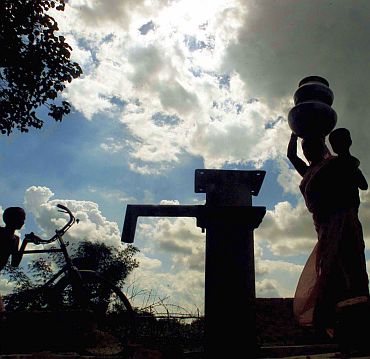
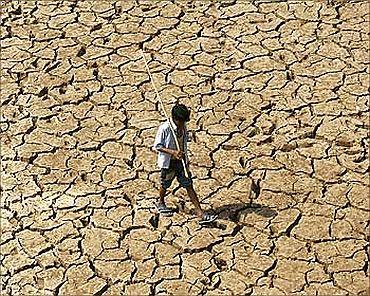

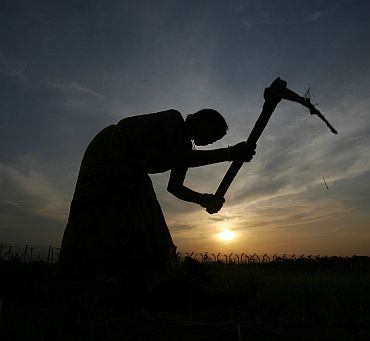
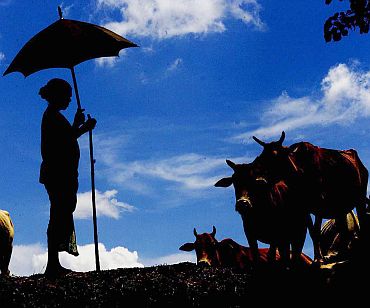
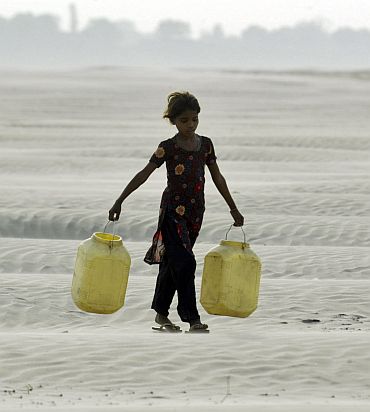

article